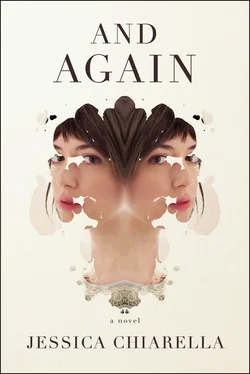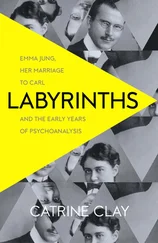It was a mistake, not to mention my impending hospital stay to the old man. I simply said good night to him one evening and left for the hospital the following morning. If I died when they cut into my brain during the transfer — which had been a risk, according to Dr. Mitchell — I would’ve preferred Dr. Grath to think I just disappeared. I talked a lot throughout the years about hopping on a plane to Bermuda or Iceland or Brazil and never coming back. If I had died on the operating table, I would want him to imagine me on a beach somewhere instead of holed up in my moldering, poorly heated studio.
Even now, I don’t know how I’ll explain what’s happened to me. I think of his eyes, those cloudy blue eyes that look like milk billowing into a cup of tea. If I lied, told him I was visiting family or on a bender, or that Bermuda wasn’t really all it’s cracked up to be, he wouldn’t be able to tell that I was lying. He wouldn’t know that I’ve been cured, while he must still live out the rest of his life looking at the world and seeing nothing. It doesn’t seem fair.
I go back to my room, steadying myself on the doorjamb before stumbling through, and flop back onto the rumpled sheets of my hospital bed. And I barely have time to register my mistake, to see the unfamiliar book on the side table and the sagging balloons in the corner and hear the flush of a nearby toilet, before a small Asian woman emerges from the adjoining bathroom. She stops where she is, and we stare at each other for a moment.
“Sorry,” I say, sliding off the bed and onto my already-exhausted legs. “I guess I got the wrong room.” She looks peculiar, strangely ageless. Her hair is dark, her eyes wide-set and topped with sparse eyebrows. Perfect teeth peek out from between her full lips. Her skin is dewy and placid, totally without texture, baby skin. There is a maturity in her features; seen from afar I might peg her somewhere around thirty. But up close, she has all the signs and markers of youth, of girlhood, and I see in her so much of myself that the recognition is immediate. “You’re another one, aren’t you? In the pilot program?” I lower my voice a bit. “SUBlife?”
“Who—” the woman says, still gaping at me as if I am some foreign creature, something unnatural, an intruder.
“I’m Connie. From the room next door. I think. I never figured that they’d put us all on the same floor. But then again, why not, right?” The woman says nothing. Maybe something has gone wrong with her transfer, maybe they weren’t able to get all the data mapped correctly into her brain. She looks at me like she’s got a screw or two loose.
“It’s weird, right?” I say, trying to help her along, buying time to pause and get my balance before starting to walk to the door. She nods a little in reply, and then makes her way to the bed in two unsteady strides. She sits down gingerly.
“Are you Mary Jane Livingston?” she says, finally. Her eyes are a pretty color, gray ringed with brown. Her question makes me laugh.
“I am,” I say, delighted that she recognizes me. Stratford Pines was the first real acting gig I landed when I moved to Hollywood, a bad soap opera but a good jumping-off point for a film career that never materialized. Still, it’s gratifying to be connected to my former self. “At least, I was. In another life.”
“I don’t like the woman they replaced you with. She’s not as pretty.”
“Susanna White. She plays Mary Jane all wrong, much too emotional. I mean, I know you’re a soap star and all, but Christ, have a little artistic integrity, won’t you?”
The woman smiles awkwardly, as if it is an uncomfortable expression for her.
“What’s your name?”
“Linda.” She looks like she’s about to say more, so I wait a moment. But the smile fades from her face and her lips press together.
“So you’ve been watching for a while then, huh? It’s been, God, about five years since I was on the show.”
“I used to watch it every day.” She has a strange conversational style; she stops talking just when it seems like she’s picking up steam. Maybe I make her uncomfortable. I should really leave. I’ve barged in on this nice, unremarkable woman as she’s recovering from a traumatic medical procedure. But the idea of going back to my empty room makes me tired in a way that is not wholly physical.
“Who was your favorite character?” I ask, trying to keep the conversation going by sheer persistence. Again, her teeth appear in a shiny stripe between her lips, as if she’s trying to remember how to smile.
“Jake.” Her eyes drop when she says it.
“He’s very pretty, isn’t he?” I’d gone home with Bradley Jennings, who plays the character of Jake Westerfield on Stratford Pines , more than once for a little post-production. I consider telling Linda this, and then decide against it. She looks like she might shock pretty easily. “I haven’t really kept up on the story since I left the show. It’s funny, you work with the same people every day for years, and you think that you’ll all keep in touch when it’s over. You’d be surprised how quickly something stops being a part of your life.” I think of Dr. Grath again, how easy it was to check into the hospital, to disappear for weeks, without even wondering about him.
“I have a TV,” Linda says. She motions toward the television mounted on the wall. “I could tell you what’s happened.”
“In the last five years?”
Linda nods emphatically. Who was this woman before the transfer? There’s something painfully disjointed about her, the way she looks and the way she talks. After all, not many Rhodes scholars are watching Stratford Pines every day for the past half decade. But she has an earnestness that I find endearing, particularly so, given the weight of my loneliness.
“Maybe,” I reply, because I’m still wary of committing pieces of my future to anyone else. I have been, ever since I got sick. It’s why Dr. Grath never invites me over, I always simply stroll down the hallway and knock on his door, unannounced. I hated plans, and appointments, things that need to be scrawled on a calendar. It felt like handing over bits of time, time that no longer belonged to me, without knowing how much I had left.
My sister visits the week after the transfer. She’s called a couple of times during the past few days, and I’ve been putting her off. Lucy is particularly high maintenance when she’s trying to get pregnant, and I’ve been telling Sam that I don’t have the energy to contend with her yet. In truth, I’m a little afraid of what she’ll think of me now. I run my fingers through my hair and it’s heavy, unwashed, thick with grease. I wonder how I’ll look to her.
She starts crying as soon as she enters the room, with one hand over her mouth. I glance wide-eyed at Sam, a silent plea for help. He’s always been good with Lucy. Better than I am, at least. She blubbers in the collar of his shirt as he envelops her small frame, rubbing circles along her back. It used to be that way with Sam and me, back when I was first diagnosed. I remember crying on our bathroom floor, the force of his arms gripping me, the damp press of his face into the back of my neck. Now, it seems like whenever I cry, he finds an excuse to leave the room.
When Lucy releases Sam she descends on me, her face wet against my cheek, her curly hair soft and fresh-smelling as it falls into my line of vision. She has the same fair features as I do, though her hair is a shade lighter brown, her eyes a bit smaller. She looks tired and very lovely.
“God, you look fabulous,” she says, groans really, sniffling and releasing me, wiping her face with her palms. “Think I could get a new body after I have another kid?”
Читать дальше












